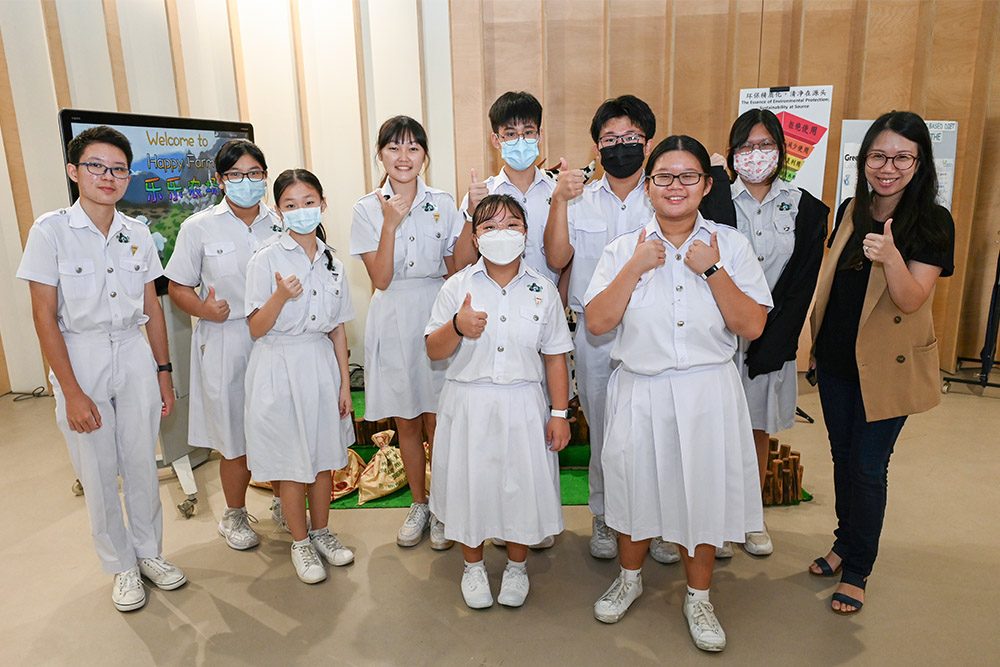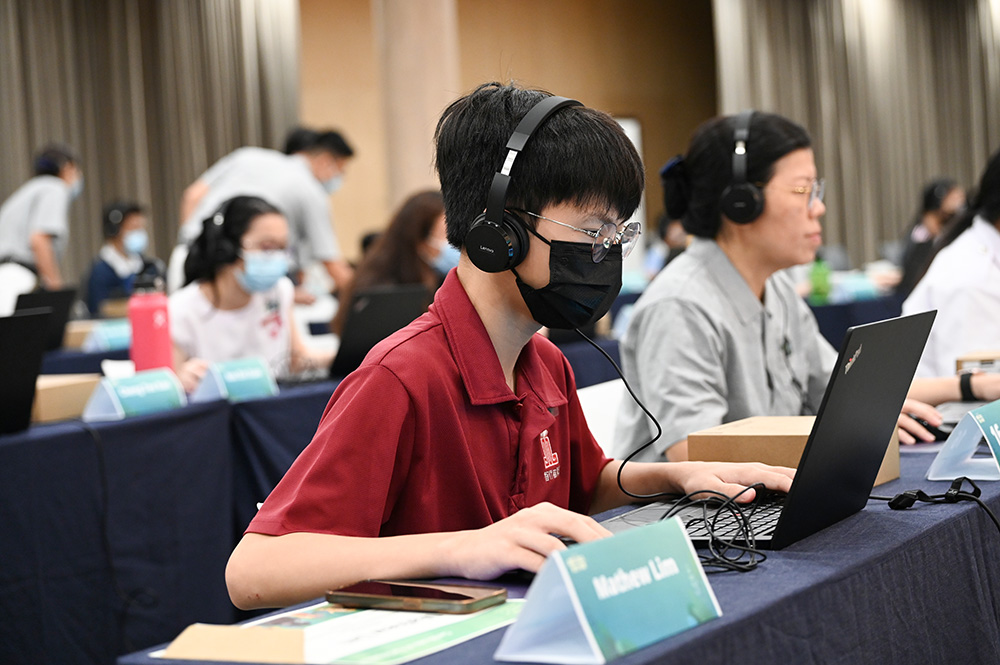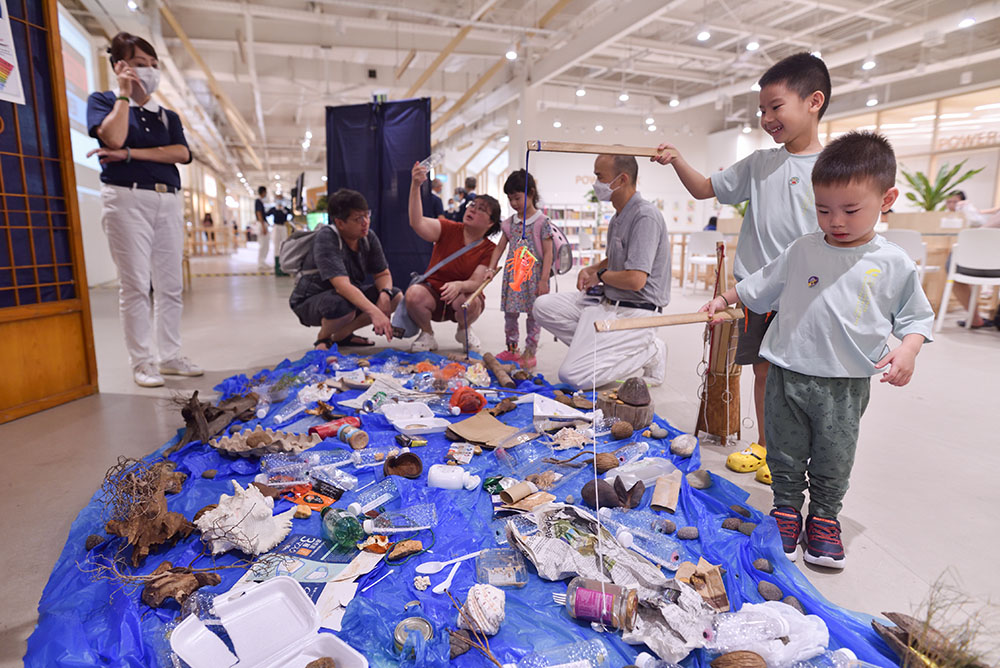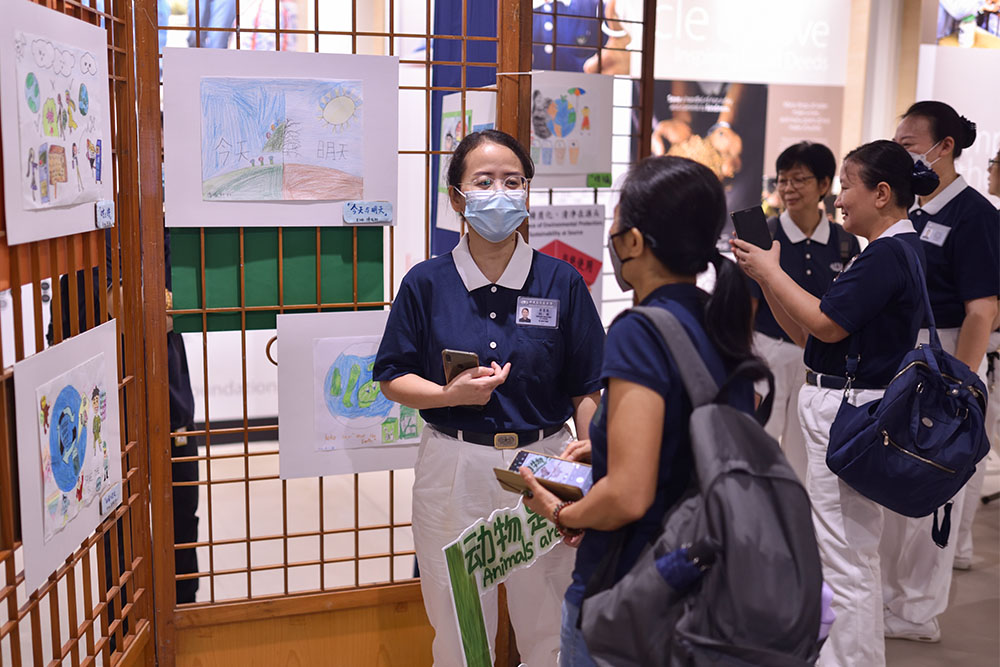
In the preliminary round held in November last year, 40 out of 310 participants from Singapore advanced to the final round. Pictured are the finalists posing for a group photo after receiving their awards. (Photo by Pua Poo Toong)
The second Tzu Chi x PaGamO Environmental Education E-Sports World Cup, which brought together gamers from six countries, was held on 9 April 2023. Held simultaneously in various locations, the World Cup was crowded and lively at the scene. After fierce competition among the players, Singapore's best player finished in 63rd place. The top 10 winners in this year's competition were all contestants from Taiwan.
The tournament was held at the Tzu Chi Humanistic Youth Centre, with a total of 310 people participating in the preliminary round in Singapore, leaving 40 finalists advancing to the final round. The event was co-organized by Tzu Chi Foundation Taiwan and BoniO Inc, the first online gaming-learning platform PaGamO, to promote environmental education through e-sports, a familiar method to young people.
The best local player, Long Jen Mee, who finished 63rd, is a mother who came with her two children. She shared her insights on stage, saying that after participating in the competition, she became intensely aware of how our diet impacts the environment. Hence, the urgent need for more people to adopt a more plant-based diet, a lifestyle that is not only healthier but also important for protecting the planet.
This international gaming competition was conducted in a fun and vibrant way, with players capturing territory on a map for every correct answer to a question, allowing young players to learn about environmental protection in an entertaining way. The questions cover twelve environment-related topics, including water resources, climate change, and the circular economy. The questions asked become progressively more difficult. The points awarded for a correct answer also increased accordingly with the highest scoring person winning the competition.

More than half of the participants this year are high school students. The Foundation hopes to attract the participation of more environmental leaders and enthusiasts in the future. (Photo by Pua Poo Toong)
Aiming to attract more local young people to participate in the game
In order to invite more people to participate in the competition, Tzu Chi staff sent posters and brochures to schools, and volunteers also actively went to campuses to promote the competition and explain how the game is conducted. The participants in Singapore were younger this year as more schools brought their teams to the finals compared to the previous year, including students from Chung Cheng High School (Yishun), Nanyang Girls' High School, Manjushri Secondary School, and Edgefield Secondary School.
A total of eleven students from Chung Cheng High School (Yishun) who are members of the school's Green Club managed to make it to the final round. In an interview, Lee Yan Mei, the teacher in charge of the team said, "When we received the invitation from Tzu Chi, we let the students decide whether they wanted to participate. To our surprise, they were so excited that they invited one after another to register for the competition, and eleven of them made it to the finals."
Lee Yan Mei was unfamiliar with gaming, but after observing how involved the students were in answering questions to score points, she realized that gaming could be educational and entertaining. She said, "The novel way of using gamification to promote environmental protection is not only full of vitality but also effective in communicating environmental issues. This novel approach has been an eye-opener for me."
Loh Chit Yew, a Secondary 2 student at Chung Cheng High School (Yishun) who participated in the competition, said that although he has always been concerned about environmental issues, his knowledge of environmental protection has become more in-depth after participating in the environmental e-sports. He said, "Participating in this e-sport has given me a lot of new environmental knowledge, such as the fact that 30 percent of water resources are wasted, a figure that shocked me so much that I will work harder to remind my family to save water."
Lim Kuan Ho, a Secondary 3 student at Chung Cheng High School (Yishun), participated in the gaming competition. Besides gaining eco knowledge from the competition, his greatest feeling was that he was no longer alone on his green journey. Lim Kuan Ho said excitedly, "When I walked into the competition venue, I saw nearly 100 people; some were participants, and others were volunteers. That made me feel thrilled. I never knew that so many Singaporeans are concerned about environmental issues."
 The Green Club of Chung Cheng High School (Yishun), led by teacher-in-charge Lee Yan Mei (first from the right), recently spearheaded an extraordinary endeavour as eleven students engaged in an environmental esports competition. Recognising the educational potential of esports, Lee Yan Mei believes that this unique platform enables students to acquire environmental knowledge in an entertaining and enriching manner. The third and fourth from the right in the photo are Lim Kuan Ho and Loh Chit Yew respectively. (Photo by Pua Poo Toong)
The Green Club of Chung Cheng High School (Yishun), led by teacher-in-charge Lee Yan Mei (first from the right), recently spearheaded an extraordinary endeavour as eleven students engaged in an environmental esports competition. Recognising the educational potential of esports, Lee Yan Mei believes that this unique platform enables students to acquire environmental knowledge in an entertaining and enriching manner. The third and fourth from the right in the photo are Lim Kuan Ho and Loh Chit Yew respectively. (Photo by Pua Poo Toong)
Acquiring new green knowledge through e-sports
Five Nanyang Girls’ High School students participated in the environmental e-sports competition this year. Among them, Wang Pei Xuan, a secondary four student, eagerly enrolled in the competition for the second consecutive year. After stumbling upon news of the event on Telegram, she promptly embraced the opportunity. Drawing from her previous experience, Wang Pei Xuan approached this year's competition with a stronger grasp of the rules, which significantly reduced her nervousness. Her motivation for participating once again stems from her desire to expand her understanding of environmental protection, including topics like the circular economy and the seven types of plastic recycling.
Matthew Lim, a secondary two student from Manjusri Secondary School, joined the competition under the recommendation of his teacher. Recognising the importance of familiarising himself with the subject matter, he diligently practised for one to two hours each day for a month leading up to the competition. Through this dedicated effort, Matthew acquired knowledge of environmental protection, including insights into environmental treaties and relevant laws and regulations. Inspired by his newfound understanding, he aims to put this knowledge into action by actively reducing the use of disposable lunch boxes to minimise waste.
Ten Yi Qian, a 15-year-old secondary three student from Edgefield Secondary School, participated in the competition for the second consecutive year. Throughout the intense 20-minute competition, Ten Yi Qian remained fully focused on the screen. Noting the heightened level of competition compared to the previous year, she emphasised the growing participation and fierce competition among students. As a member of Tzu Shao, Ten Yi Qian is familiar with environmental protection knowledge, but she acknowledged that the competition has exposed her to new topics and discussion questions that extend beyond the scope of conventional classroom learning.
 Matthew Lim signed up for the competition on the recommendation of his teacher. To familiarise himself with the topic, he practised for one to two hours each day for a month leading up to the competition.
Matthew Lim signed up for the competition on the recommendation of his teacher. To familiarise himself with the topic, he practised for one to two hours each day for a month leading up to the competition.
Environmental protection has become a common topic among families
On the event day, approximately 100 attendees, including teachers, parents, and students, came to show their support and encouragement to the contestants. Among the parents present were Pang Yok Fah and her husband, who were there to cheer for their son. Pang Yok Fah said, “My son has been dedicating several hours each day to practise for the competition. Environmental issues have, therefore, become a frequent topic of discussion within our family.”
Pang Yok Fah and her husband often tell their son, “If you encounter a problem, ask “Google God” to find your answer so that you can understand the problem.”
This year's event featured a special explanation of the "Climate Clock," serving as a reminder that we have a limited six-year window to reduce carbon emissions and save the Earth. The urgency of this message underlines the need for immediate action.
Seah Jia Jun, the event's deputy coordinator, highlighted the event's focus on demonstrating practical implementation strategies for environmental protection rather than solely emphasising the environmental crises. He said, “Tzu Chi recognised the urgency of the situation, prompting them to shift their approach from silent activism to vocal advocacy.”
Sin Yuen Fook, the coordinator, expressed satisfaction with the response received for this year's competition, highlighting increased participation from schools and the public. Looking ahead, he expressed the hope of attracting even more dedicated environmental advocates and eco-warriors in future events.
Tzu Chi Humanities Youth Centre organised nine booths for participants to explore and be engaged. Chua Wee Chong, the environmental protection volunteer in charge of the booths, emphasised the primary goal of conveying information through the exhibition. The inclusion of the climate clock served as a visual warning, urging individuals to recognise the Earth's distress signals. Chua also emphasised the centre’s continuous efforts to raise awareness about the importance of environmental protection, aiming to inspire greater participation in environmental conservation actions.





